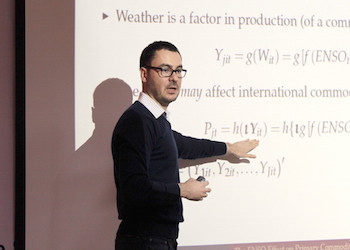- Details
On February 4th, ISET hosted politician and development expert Ad Melkert, who gave a presentation titled "Global Economic Governance: Past or Future?". At the beginning of the presentation he talked about the post WWI and WWII periods and the establishment of international organizations like the ILO, UN, IMF, WB, ECB, OECD etc. He called these periods the “Promising Past”. He pointed out the aforementioned organizations’ global achievements in the areas of poverty reduction, connectivity, health, food security, climate, etc.
Afterwards he talked about Economic Convergence supported by different events (meetings, conferences etc.) all over the world in order to exchange information, share standards, experience on market economy and so on.
- Details
On January 22, Dr. David Ubilava, from the the University of Sydney, led a seminar on the subject of his recent paper, "Rises and Falls in Primary Commodity Prices: Blame it on ENSO or Leave Them Kids Alone?"
The speaker began by introducing the essence of his research, which aims to estimate the effects of ENSO on commodity prices. ENSO is an abbreviation of El Niño Southern Oscillation, which refers to the effects of a band of sea surface temperatures that are anomalously warm or cold for long periods of time.
This process has a cyclical character and strong effect on the production and distribution of different commodities. If ENSO-related weather disturbances are synchronized across commodity producer countries, the causal relationship between ENSO and commodity price movement becomes an economic corollary; however, this causality is not always there. The strength of the linkage depends on the concentration of the primary commodities in the ENSO-affected regions, the availability of close substitutes, and the ability of producers to adapt to climate shocks in the short term.












